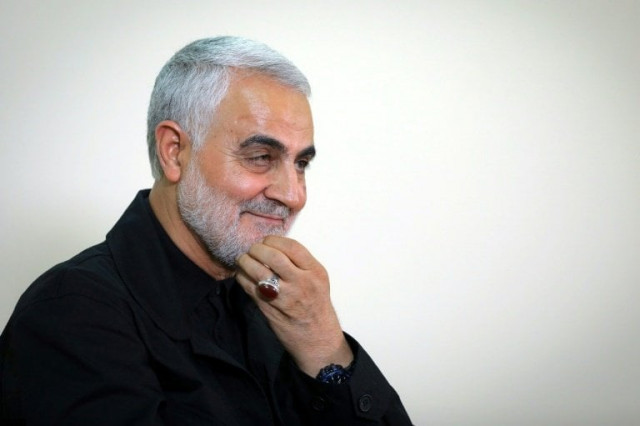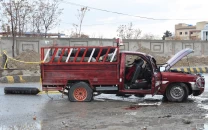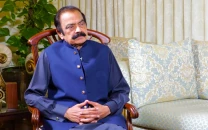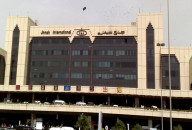‘Adopt pragmatic policy on US-Iran crisis’
Speakers urge govt to call parliament session, create consensus on future action

Qaseem Soleimani. PHOTO: AFP
Further, a special session of the parliament must be convened where lawmakers are taken into confidence and consensus is evolved on a future course of action.
This was urged by policy and security experts, former diplomats and academics who gathered in Islamabad on Wednesday for a discussion on “Escalation between US and Iran; Regional Implications and Options for Pakistan”. The discussion had been organised by the Center for Global and Strategic Studies (CGSS).
The participants discussed the US-Iran situation in detail and deliberated the possible policy options for Pakistan. The US killed Soleimani after accusing him of being involved in conspiracies against the US and the killings of many innocent people. However, the assassination did violate international law and Iraq’s sovereignty.
"80 American terrorists killed in Iran missile strikes"
By assassinating Soleimani, they said that the US has triggered a situation causing Tehran to respond by attacking the Ain al-Asad airbase in Iraq.
Even though Iran says it does not want any further escalation, Iran’s main objective is the withdrawal of all US forces troops from Iraq and other Middle East countries, they said.
The participants were of the view that any reconciliation process between the two sides is not evident at the moment has created a difficult situation for Pakistan to take any stance.
However, the participants suggested that Islamabad should remain neutral and its territory must not be used for the interest of any other state.
They stated that the US-Iran tussle is three dimensional with global and regional facets, particularly its effects on Pakistan.
As far as, military escalation is concerned, the participants believed that neither the US nor Iran will not opt for a full-fledged war. The situation, though, remains tense and confrontations are likely to continue.
One immediate consequence of the US and Iran tensions is the increase in oil prices. Elsewhere, there is a possibility that the Gulf region could be consumed by a proxy war. This, however, will only further worsen the situation.
With regards to Pakistan, they said that while the US is trying to bring normalcy in its relations with Pakistan, the current situation could continue to test Pakistan’s various commitments with the US in the context of the US-Taliban peace talks.
Furthermore, Pakistan will have to maintain a strategic balance between Saudi Arabia and Iran.
The Arab world, for its part, is divided and polarised, they discussed.
By painting Russia as a close ally of Iran, the US is trying to convey the message that perhaps Iran and Russia could be a threat to US interests in the region and regional powers such as Saudi Arabia.
China, meanwhile, has offered military assistance to Iraq while Russia is already involved in the region with Syria and Iraq.
It is the need of the hour that global powers must use their influence to deescalate the situation, they urged.
In the case of full-fledged war, Pakistan will have to quickly decide its stance and come up with a policy.
Speakers warned that India can also benefit from this situation and can create further tensions on the eastern border.
Pakistan must adopt a pragmatic foreign policy to tackle this situation and adopt a management strategy. The leadership of Pakistan must engage in the mediation process through bilateral visits to Iran, the US and other major players, they urged.
World leaders call for restraint after Iran targets US troops in Iraq
In this regard, they said that the government must call a parliamentary session to discuss the national security scenario and create consensus.
In the past, Pakistan has successfully maintained its neutral stance on various global issues including the Iran-Iraq war and Yemen crisis. However, it is about time that Pakistan must frame a policy to come up with a comprehensive strategy.
The panelists included CGSS President Major General (retired) Syed Khalid Amir Jaffery, former federal defence minister Lt Gen (retired) Naeem Khalid Lodhi, former envoy to Sri Lanka Major General (retired) Shakeel Hussain, former envoy to Mauritius Major General (Retd)Raza Muhammad, former ambassador to US Jalil Abbas, former ambassador to India Abdul Basit, and others.
Published in The Express Tribune, January 9th, 2020.



















COMMENTS
Comments are moderated and generally will be posted if they are on-topic and not abusive.
For more information, please see our Comments FAQ